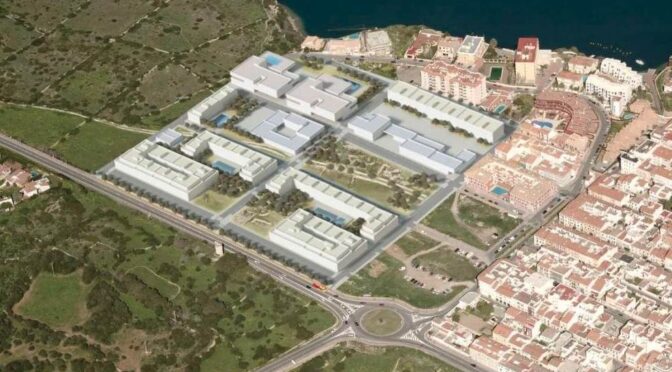Views: 1052
A desalination plant that would discharge brine into an infiltration well is the solution proposed by the promoters of the Repòs del Rei Partial Plan, a development planned between Maó and Es Castell that presents various problems.
Repòs del Rei is an old project that has now been revived through an unusual procedure. The City Council put the project on public display for 45 business days (BOIB of June 13th), but along the way, it decided to suspend this display and move directly to initial approval. Nonetheless, GOB has submitted a written statement of considerations to be taken into account by the technical and legal services. An infiltration well in an area at risk of aquifer contamination
The Es Castell area has an overexploited aquifer. According to the Balearic Islands Hydrological Plan, the aquifer has an exploitation index of over 100%. Given this situation, the documentation of the Partial Plan concludes that the only solution for supplying the sector is through seawater desalination. Therefore, equipment with a capacity of 100 m³/day is proposed.
It is intended to draw salty water from a well near the coast. The generated brine is to be discharged into an infiltration well to avoid direct discharge into the port. Regarding this option, GOB reminds that the entire area where the Partial Plan is located falls within a zone at risk of aquifer contamination. If the hypersaline reject water migrates inland, the aquifer could face serious additional problems. Protected housing area, energy efficiency, and landscaping
From the Partial Plan data, it is inferred that 11,966 m² are planned for free-market multifamily housing and 1,981 m² for public protection multifamily housing. This gives a total of 13,947 m². However, the Island Territorial Plan requires 30% of the land area to be allocated for protected housing in the residential areas of new partial plans. Thirty percent would be 4,184.1 m². Currently, only 14% is being allocated, which is less than half.
Furthermore, European, national, and regional regulations require new buildings to have nearly zero energy, and the required amount of energy must be covered by renewable energy sources located in those buildings or facilities or on insular land, which is not considered in the current documentation.
In terms of landscaping and potential water consumption, GOB reminds that the land is within a priority habitat at the European level, which, despite not being protected because the developable area has been planned for some time, should be subject to special criteria for green and landscaped areas.
In this regard, it is requested that the preservation of these types of habitats be maximized, as well as other Mediterranean gardening resources that avoid water consumption, pesticide use, or the importation of exotic or invasive species. Tourism moratorium and hotel areas
The Partial Plan proposes the creation of 500 hotel beds. The Balearic Islands are under a tourism moratorium due to tourist congestion and its related effects. It is not known what the resolution will be when this ends, but the new Government also recognizes the situation of collapse and the need not continue increasing tourist accommodation capacity.
Processing new hotel zones could create rights for developers that might later not be executable. For these reasons, it has been requested that the two zones be dedicated, in any case, to the construction of protected housing, which could indeed meet a social need.
This text is an adaptation from an automated translation of the original publication in Catalan on the GOB Menorca website.

